List of Basic Silversmith Tools for Beginners & Experts
Silversmithing is a metalworking trade that specializes in the shaping and crafting of silver objects. This discipline requires a few essential tools to complete a wide range of projects. However, there are also specialized tools avail to refine your skills and deliver a more polished look to your final product.
Some of these tools can be simple to use for silversmiths and hobbyists of all skill levels and others may be a little more advanced. In the list below, we will discuss the purpose of each silversmithing tool, how important it is to have in your workshop, and whether or not it will suit your needs at your appropriate skill level.
Complete List of Tools For Silversmithing & Silversmiths
1) Jeweler’s Saw
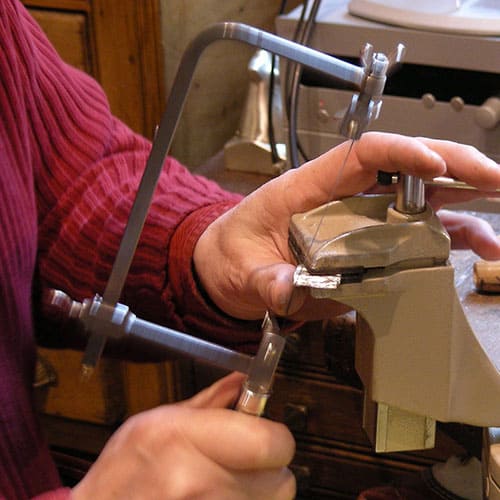
The jeweller’s saw, also known as a piercing saw, is one of the staple tools found in a jewellery maker’s workshop. Since a lot of jewellery used silver metal, this is a great tool to use in order to cut metal pieces into fine shapes and sizes.
The blades associated with jeweller’s saws can be adjusted based on your intended application. This tool can be beneficial to silversmiths of all skill levels.
- 3 in 1 small professional jeweler's saw set
- Included: jeweler's saw frame with tension nut, v-slot bench pin with clamp, and 144 pc piercing...
- Saw frame with tension nut specs:Overall length: 8-3/4'' long; Rail size: 8mm Wide x 2.86mm Thick
2) Snips & Scissors

Silversmithing snips are tools that are widely used in jewellery making because they can easily cut small pieces of metal with precision. Snips have the appearance of small scissors and are available with different types of handles to suit your needs and personal preferences.Silversmiths of all skill levels should also have this tool when working with small pieces of silver.
- [PRECISION MINI DETAILED SCISSORS] The finely ground thin blade reduces cutting resistance and...
- [BOND FREE EXTRA NONSTICK BLADE] "BOND FREE" is a high-quality tetrafluoride coating, exclusive to...
- [UNMATCHED SHARPNESS BY JAPANESE CRAFTSMANSHIP] Made in Japan with high-grade Japanese stainless...
3) Pliers and Cutters
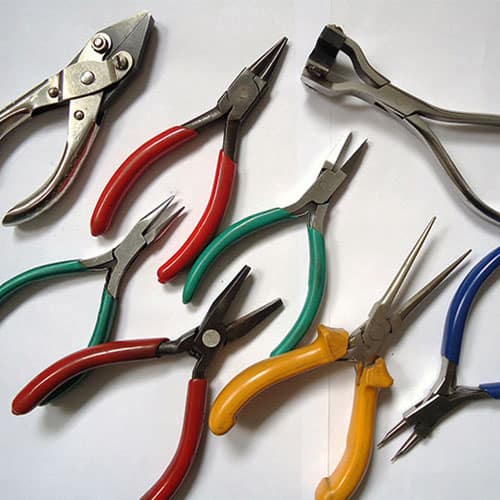
Pliers and Cutters are very useful in manipulating, shaping, and cutting small metal pieces. They are a staple tool in any jewellery-maker’s toolbox and can translate very well into many silversmithing projects.
In addition to being multi-purpose tools, they can also come in different shapes for more specialized applications.
- Ideal for jewelry, watchmaking and other crafts
- Made of high quality carbon tool steel with wooden stand
- Jaws are hand finished with beveled corners
4) Jeweller’s Files
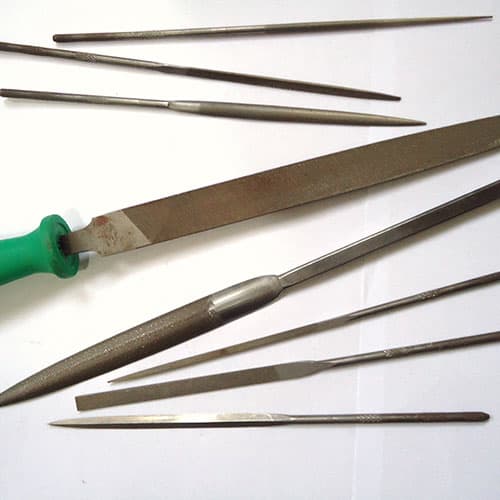
There are many different types of jeweller’s files available for use in both the silversmithing and jewellery making trades. These files can feature half-round or flat shapes. Rounded files allow a smith to work grooves or curves into a workpiece and smooth out certain areas.
Flat files are also very versatile tools that can be applied to many different silverworking projects. It is important that the flat file you choose to have at your workbench works well with the material you will be filing and the amount of detail you would like it to be able to create on your workpiece with ease.
Despite their ability to work well in most applications, there are still different types of and sizes of flat files available that can be picked and sizes properly based on your application. Overall, it would be beneficial to your practice if you had a file in your workbench.
- Overall lengths of 5 1/2-Inch long
- Include 12 files in a snap shut plastic wallet with hanging hole
- Contains one file each of: hand, flat, three square, half round, crossing, round knife, barrette,...
5) Planishing Hammer
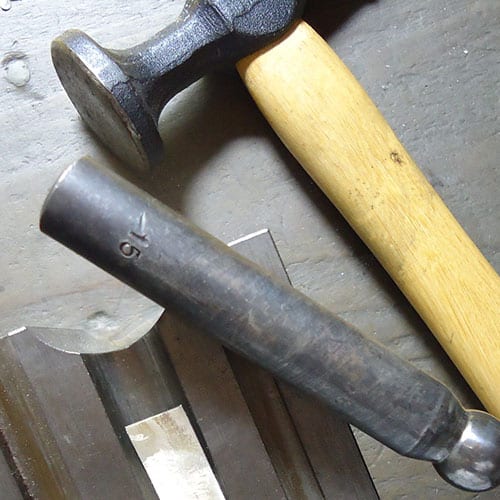
A planishing hammer is typically used in metalworking to flatten a sheet of metal through repeated blows to its surface by a hammer. Planishing hammers feature a flat face that aids in the appearance of a smooth appearance of a sheet of metal.
- PLANISHING HAMMER: This shaping tool is used for a metalworking technique that involves finishing...
- METALSMITHING TOOL: A 9-inch wooden handle is the base for this two-sided hammer. The 80mm steel...
- GET CREATIVE: Use our planishing hammer to shape and smooth the surface of gold, silver, brass,...
6) Ball-Pien & Cross-Pien Hammer
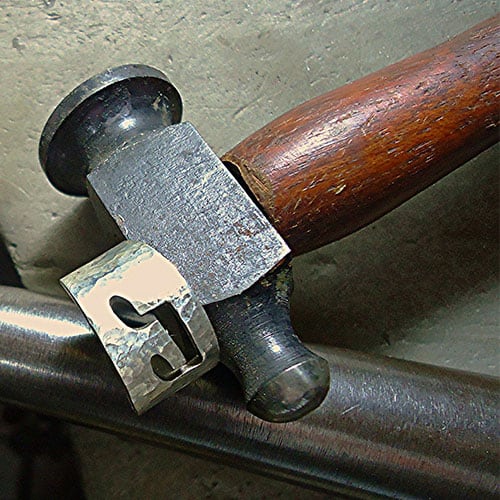
A ball-pein hammer is one of the most useful tools to have a metalworker. This hammer can be used in a variety of applications, including silversmithing and jewellery making. The ball-pein hammer is similar to the cross-pein hammer, except for the fact that it has a rounded head that can form hollow, textured shapes into sheet metal.
A cross-pein hammer is another useful tool in jewellery making and silversmithing projects. This hammer features a round flat head and a thin edge that easily creates textured markings on metal surfaces.
- VERSATILITY ON THE JOB – Perfect for forming and shaping sheet metal, striking punches and chisels...
- FORGED STEEL BALL END – This ball pein hammer features a smooth rounded ball end allows workers to...
- FIBERGLASS HANDLE – Built with a lightweight, durable handle to offer a comfortable controlled...
7) Jeweller’s Anvil

The anvil is arguably one of the most important pieces of equipment that any metalworker should have available in their workshop. Anvils provide a very strong, stable surface on which to work and manipulate metals, or other hard objects, without fear of breakage.
Small anvils for silversmithing are often constructed from forged or cast tool steel, which is a strong material capable of sustaining blows from a silversmiths hammer without issue. The anvil itself also has smaller features, such as the pritchel hole, that can be very useful when shaping jewellery and will allow you to more easily mould the work-piece.
- This is a new double horn anvil
- Great for metalsmiths, riveting, flattening, forging and forming metal
- Has a round and flat horn
8) Bench Vise

A bench vise is a stationary tool that can firmly grip onto a workpiece while a metalworker shapes it without having to use his or her own hands to hold it in place.
- The Table Vise will not deform even under high pressure, the vise is made of cast aluminum, the jaws...
- Jaws are 3" x 3/4" / 79mm x 17mm with a 2" / 51mm opening, the clip has a wide enough opening for...
- Adjustable and rotates to any possible angle, rubber Jaws for no scratch and firm clamping, enabling...
9) Torch
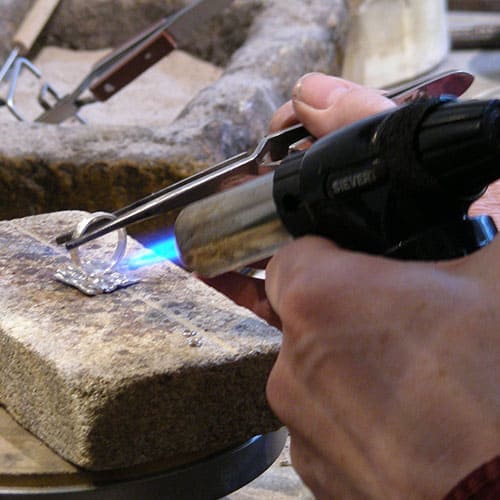
A torch is a very important tool to have when working in metals. The ability to heat up a metal when forming and shaping it can greatly ease the amount of effort that you have to put into working it as smith. There are many different kinds of torches available for purchase in common hardware stores and they are a very useful investment for silversmiths of all skill levels.
10) Sanding & Polishing Tools

There are many different types of hand-held and rotative tools available for silversmithing. Some of these tools include simple buffs, brushes, and sanding tools. Buffs allow you to create a lustrous finish on the workpiece surface.
Wire brushes can be made of nickel, brass, or steel and are very effective in smoothing out and polishing rough surfaces because their abrasive characteristic can remove excess material.
Rotative heads, such as abrasive wheels, bands and polishing bristles are useful for obtaining a more unison finish with a higher level of accuracy. Polishing your jewellery or workpiece will elevate its appearance and highlight the smooth, shiny aspect of silver metal. Although many silversmiths rely on motorized polishing solutions, you can still obtain a great finish even with simple polishing cloths, which are easily accessible and relatively affordable.
No products found.
11) Stakes
Stakes are great tools to use when forming silver into different shapes. They are made in different shapes to accommodate for a variety of shape designs. Silversmithing stakes can be held in place while a silversmith shapes their workpiece around it.
12) Silver Solder
The process of joining two pieces of metal is called soldering. If you would like to join pieces of silver, you may need to purchase silver solder. Silver solder is a piece of alloyed metal that can be heated up to a melting point that allows you to join together two other pieces of metal with the melted solder.
There are different solder types available (hard, medium, and easy), classified by different flow temperatures. This can allow you to solder metal multiple times with different types of solder without worrying about compromising joints you previously soldered.
- Excellent quality general purpose solder
- No-Clean Flux Core
- For use on Circuit Boards and flux reside is non-corrosive
13) Flux
The use of flux goes hand-in-hand with soldering. Flux is a chemical that can be used to prevent oxidation of metal when soldering. Boric acid is a common type of flux used in jewellery making.
- Active range 1050°F - 1600°F
- Model Number: SSWF1/4
- Item Package Dimension: 2.38" L x 2.38" W x 2.25" H
14) Pickle
Pickle is a solution that can be used before after the soldering process in order to remove flux and any oxidation found on soldered metal. This liquid can be heated up prior to use in order to enhance its performance.
- Pickling compound for flux removal after soldering
- Country Of Origin: United States
- Model Number: PLSPARE2.5
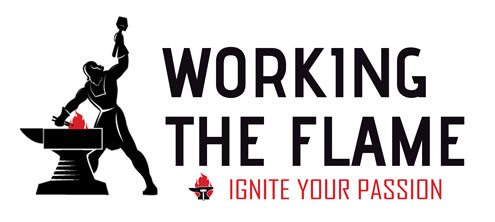


![CANARY Japanese Mini Craft Scissors 4' [Extra Non-Stick], Small Detail Scissors for Paper Crafting,...](https://m.media-amazon.com/images/I/3141dpi4DFL.jpg)











That was fabulous and so helpful.
Besides the saw is there anything else you can suggest when cutting silver? I’m thinking of of burrs which don’t take forever to cut through. Thanks Malcolm